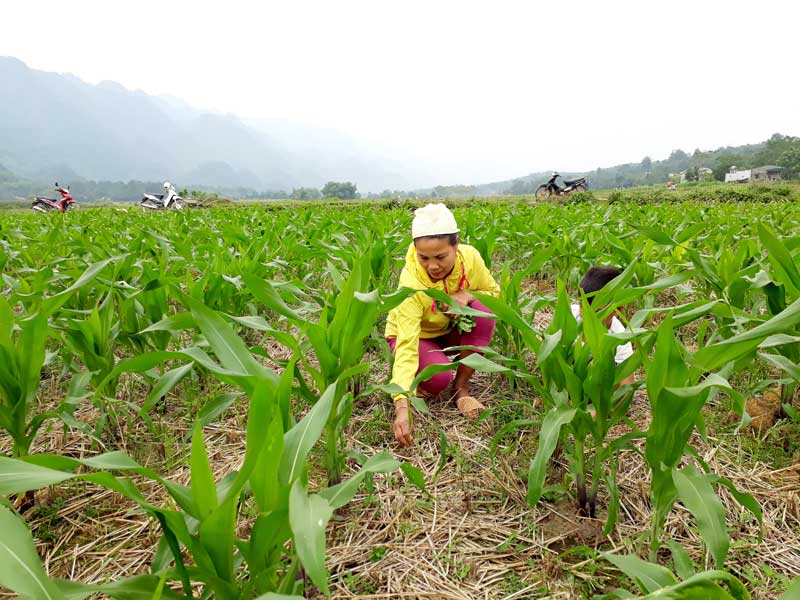
(HBO) – Despite the devastating impacts of the recent floods, farmers in Phu Luong commune, Lac Son district, the northern mountainous province of Hoa Binh, have maintained agricultural production. Over the past nearly ten years, after harvesting the summer-autumn crop, locals continued with the winter crop.
Local farmers are working hard in corn fields. Such vast, green corn fields have erased the image of fields previously destroyed by downpours and floods in many localities of Hoa Binh.
"Over the past ten years, the summer-autumn crop has been followed by the winter crop, mainly corn cultivation. Local farmers also plant vegetables and bulbs like onion in winter. However, a number of fields have been let free during this crop due to impacts of the recent floods. Phu Luong now has 125ha of corn, more than 50ha of vegetables and beans, and 1.5ha of onion,” said Bui Van Au, Vice Chairman of the Phu Luong commune People’s Committee.
Bui Thi Tach from Pheo hamlet, Phu Luong commune, Lac Son district, is taking care of her family’s winter corn field
Thanks to a good water drainage system, the corn field of Bui Thi Tach’s family has not been affected by the floods. Knee-high corn plants are growing together with celery cabbage.
"Traditionally, after the summer-autumn crop, fields were let free until spring. However, over the past ten years, local farmers have cultivated the winter crop. Winter corn plants grow even better than in main crops despite initial difficulties. Unseasonal corn is sold at a higher price while providing animal feed,” Tach said.
To facilitate irrigation, local farmers have dug small cannels around fields.
"The cannels aim to discharge water in case of downpours and bring water to corn fields. Winter corn requires more care in winter. Apart from water, winter corn plants need fertilizers,” Tach added.
Next to fields of Pheo hamlet, fields of Mong hamlet are also covered with green corn plants during this winter.
Winter crop production plays an important role to Phu Luong, a remote commune with a lot of difficulties and poverty rate of over 60 percent.
"Residents of Phu Luong commune, which has been included in the Programme 135, have to face various economic difficulties. Therefore, winter crop production has brought about economic values, helping them increase income and ensure livestock feed. In the years to come, we will continue cultivating winter crops while encouraging local farmers to grow higher-value plants in order to raise income,” said Bui Van Au./.
Dao Village’s honey – a product certified with a 3-star OCOP (One Commune One Product) rating by Thong Nhat Agricultural Cooperative in Dao Village (Hoa Binh City) – is highly regarded by consumers for its quality, richness, and variety in packaging. The distinctively sweet taste of Dao Village’s honey leaves a lasting impression on anyone who has tried it.
In alignment with Project No. 07-DA/TU, issued by the Hoa Binh provincial Party Committee on November 1, 2021, Lac Thuy district has actively promoted investment and supported the sustainable development of its industrial and handicraft sectors during the 2021–2025 period. Alongside this, the district has remained committed to preserving and revitalising traditional craft villages.
Located in the northern part of Lac Thuy district, with a temperate climate and fertile soil, Phu Thanh commune has great potential and advantages in growing tea. The long-standing experience, combined with strict adherence to organic farming practices in the tea gardens, ensures that the dried tea products from Phu Thanh and Lac Thuy as a whole are sold out immediately upon production, providing a stable and prosperous life for the local people.
Amid efforts to streamline the administrative apparatus, Hoa Binh province has intensified measures to address challenges in land clearance, resettlement support, and infrastructure investment, aiming to speed up the progress of key projects.
Hoa Binh province has posted an unprecedented economic growth rate of 12.76% in the first quarter of 2025, marking its highest quarterly performance to date and positioning it as the second fastest-growing locality in the country, trailing only Bac Giang province.
Under current regulations, products in the One Commune – One Product (OCOP) programme that are rated three stars or higher must undergo re-evaluation every three months. However, in reality, some of these products fail to consistently meet the required standards, raising concerns about the sustainability of their OCOP certification. This underscores the urgent need for producers to enhance product quality and gradually develop their OCOP products into strong, marketable brands.



